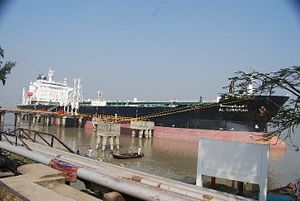The Bay of Bengal is fast becoming a hub for international commerce. The bay, which opens into the Indian Ocean and is surrounded by India, Bangladesh, Myanmar and Thailand, provides access to a quarter of the world’s landmass, a third of the world’s population and 40 percent of the world’s oil and gas reserves.
Economic powerhouses including India, China and Japan are investing heavily in the region. But the effort to reinvigorate one of antiquity’s greatest trade routes is being led, to the surprise of some, by Bangladesh.
The Bay of Bengal region is at a vital global crossroads, servicing member states of the South Asian Association for Regional Cooperation and the Association of Southeast Asian Nations. This means the Bay region carries trade from nations ranging from Pakistan to the Philippines.
Bangladesh’s capital city, Dhaka, is home to the Bay of Bengal Initiative for Multi-Sectoral Technical and Economic Cooperation, known as BIMSTEC, a group of nations devoted to maximizing the Bay region’s many important industries, including technology, agriculture, fisheries and tourism.
Bangladesh Prime Minister Sheikh Hasina has called on BIMSTEC member nations India, Myanmar, Nepal, Sri Lanka, Bhutan and Thailand to identify ports that need and deserve better connections. BIMSTEC nations combine for a Gross Domestic Product of $2.7 trillion and a potential consumer base of 1.5 billion people.
At a 2016 summit in India, Prime Minister Hasina identified three ways that BIMSTEC and BRIC nations (Brazil, Russia, India and China) can engage, including infrastructure development, technology sharing and sustainable development. The region’s hydroelectric potential, she argued for example, exceeds 300 gigawatts and its expansive marine resources remain largely untapped.
Bangladesh, she said, is an ideal location for international investors, a place where their money will be valued and protected. “We can assure you that our regimes and incentives are indeed competitive; and regulatory and policy environments are supportive,” she said.
Despite justified optimism at the region’s economic future, challenges remain. A prime need is upgrading ports around the Bay of Bengal to deep-water status, to allow the world’s biggest cargo ships to carry goods to and from the region.
One study estimates that enabling deep-hulled cargo ships to enter the Chittagong and Mongla ports around the Bay of Bengal will drastically cut the cost of transferring goods from large container ships to smaller ones by as much as $15,000 per day per port.
Nations outside the region such as Japan understand the size of the BIMSTEC market and its limitless potential and are looking to pour money into regional infrastructure improvement. Japan is funding a $4.5 billion, 1,200 megawatt coal power plant and deep-water terminal in the Bangladesh port city of Matarbarhi on the Bay of Bengal in the southern part of the country. To facilitate delivery of coal to the power plant, a 60-foot-deep channel would be built.
China, too, is investing in the Bay of Bengal. Chinese enterprises have signed agreements worth $600 million to build two of the nineteen components necessary for the Payra Sea Port Project in Patuakhali, Bangladesh.
The Bangladesh-China Power Company is also investing in Payra, building a 1,320-megawatt power plant around the port. The United Kingdom’s DP Rail has agreed to invest $7.5 billion to develop a Dhaka-to-Payra port rail system.
Prime Minister Hasina is spearheading the charge for further investment and has spoken about the need for additional commercial corridors to handle trade in the region.
The Bay of Bengal supplies East Asia with crude oil from the Middle East and allows for the free-flow of international goods throughout the region. It is already a powerful economic engine in the region. Further investment and cooperation could return it to the hallowed days of years ago when it was one of the world’s great trade routes.
Sajeeb Wazed is Bangladesh’s chief information technology adviser and the son of Prime Minister Sheikh Hasina.
































